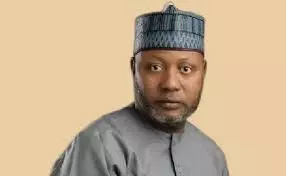- Home
- /
- More
- /
- Science & Technology
- /
- Minister seeks...

Mr Mohammed Abdullahi, Minister of State for Science, Technology and Innovation, has called for synergy between government, industry and academia to rejig the nation’s economy in the face of dwindling resources. Abdullahi made the call on Monday while delivering the 2nd Eminent Persons Lecture Series of Igbinedion University, Okada. Supreme reports that the lecture was […]

Mr Mohammed Abdullahi, Minister of State for Science, Technology and Innovation, has called for synergy between government, industry and academia to rejig the nation’s economy in the face of dwindling resources. Abdullahi made the call on Monday while delivering the 2nd Eminent Persons Lecture Series of Igbinedion University, Okada. Supreme reports that the lecture was titled “How government-academia-industry linkages drive economic development in Nigeria”.
The minister said that diversification of the economy was imperative, noting that the Government-Academia-Industry (GIA) model started with a theoretical conceptualization based on the need to create synergy between the key stakeholders. The synergy, he said, was to deposit and harvest the knowledge generated by the Knowledge Institutes (KIs) for the socio-economic development of the nation. Laying emphasis on the desirability of such a synergy, the minister said that industry needed a boost due to the dwindling percentage of locally sourced capacity and raw materials.
“The gap in productive synergy among the components of the Triple Helix model in Nigeria is a reflection of the funding of Research and Development (R&D) intensity, when compared to a country like Malawi with 1.70 as at 2007.“ Whereas, the Academia are interested in generating patents that are beneficial to the society, industry and Academia; a challenging task that is hindered by a deficit in State-of-the-Art laboratory facilities, can be facilitated by industry within the confines of the necessary synergy or collaboration. “The country’s Gross Domestic Expenditure on R&D (GERD) as a percentage of Gross Domestic Product (GDP) (GERD % GDP) of Nigeria was only 0.2 per cent.“ Again, industry contributed 0.2 per cent of the funds used in conducting R&D activities in Nigeria as against 50.9 per cent in Ghana,” he said.
He explained that the Knowledge-Institutions-Universities inclusive were only able to source for 0.1 per cent of the funds used in conducting R&D in Nigeria as against the 46.0 per cent recorded in Uganda as reported in the ASTII R&D survey, 2007.“This indeed must change as our industries depend on foreign sources of knowledge to sustain production and possibly meet challenges of competition.“ For companies to remain productive and competitive, the need for stability of cooperation in terms of policy decision making relating to areas such as the transfer of knowledge and technology, as captured in the Triple Helix framework must be active and living.
Earlier, the Vice Chancellor of the University, Prof. Lawrence Ezemonye, said the institution was poised to escalate its partnership with the Federal Ministry of Science, Technology and Innovation to produce skilled graduates. This, he said, was to meet the national manpower needs and socio-economic development of the country. He said the university had earlier introduced Skills Set and Master Classes, which are embedded in all academic programmes, to further enhance the skills content of the curriculum, thereby making Igbinedion University a truly entrepreneurial university. Ezemonye said that it was a policy at Igbinedion University to have two persons, one each from the Department and relevant Industry counterpart, to supervise the theses and dissertations of MSc and PhD students. He said the practice would foster the synergy needed between the academia and industry, for qualitative educational outcomes.




